Bev Spicer's Blog, page 34
December 3, 2013
Books Direct: "My Grandfather's Eyes" by B. A. Spicer
Books Direct: "My Grandfather's Eyes" by B. A. Spicer: ON SALE for $0.99 My Grandfather's Eyes by B. A. Spicer My Grandfather’s Eyes by B. A. Spicer is ON SALE for only $0.99 (s...
Published on December 03, 2013 04:40
December 1, 2013
Countdown Promotion for 'My Grandfather's Eyes'
'My Grandfather's Eyes' is a book that I feel very pleased to have written. On re-reading it recently, I was surprised how single-minded I had made Alex and how much I had made her suffer, too. Some people have said that she is egotistical, self-obsessed, even evil! And yet, it is clear that she has caught the imagination of my readers, who also describe her story as riveting.
She is not a conventional protagonist, certainly. Her story is that of a young woman of unusual appearance, who discovers that there is more to her family history than meets the eye. The people who surround her are not all they seem, and she is drawn into a world of secrets that will ultimately change her life.
I have the greatest respect for Alex, even though she may seem cold, even ruthless at times. She is an intriguing character, who learns quickly and adapts to what is possible in a world where what we want is generally conditional on the wishes of other people. While her aspirations may not always be attainable, she is an intelligent and pro-active human being, who will always find a way forward.
Is Alex Crane evil? I'll let you decide.
'My Grandfather's Eyes' will be listed in the Amazon Countdown promotion from 3rd - 6th December, at a starting price of 99p/$0.99. Just click on the link to read the sample chapters:
viewBook.at/B009B7W10U
She is not a conventional protagonist, certainly. Her story is that of a young woman of unusual appearance, who discovers that there is more to her family history than meets the eye. The people who surround her are not all they seem, and she is drawn into a world of secrets that will ultimately change her life.
I have the greatest respect for Alex, even though she may seem cold, even ruthless at times. She is an intriguing character, who learns quickly and adapts to what is possible in a world where what we want is generally conditional on the wishes of other people. While her aspirations may not always be attainable, she is an intelligent and pro-active human being, who will always find a way forward.
Is Alex Crane evil? I'll let you decide.
'My Grandfather's Eyes' will be listed in the Amazon Countdown promotion from 3rd - 6th December, at a starting price of 99p/$0.99. Just click on the link to read the sample chapters:
viewBook.at/B009B7W10U
Published on December 01, 2013 10:14
November 15, 2013
The writing of 'One Summer in France'
When it all started: 1979 (a very good year).
Where it all started:Keele University (northern England, non-prestigious, apart from renowned Astronomy department –run by friend of Sir Patrick Moore – name on tip of tongue/impressiveEnglish department - gargoyled hall, windows bit too high to gaze out of).
Friendships formed, (in order of importance/in no particular order – bit of a mix, really): Carol (best friend/totally brilliant/mad/blond/netball fiend, wing-attack/can be trifle politically incorrect/bit sweary/good punch).Alison (uptight/control freak/freak/not really friend but essential enemy/obsessive milk hoarder – all property is theft, Alison).James (hopelessly besotted with Bev – brash totty/betrothed to Jocasta – posh totty/doomed/dishy/dope/eventual accountant, argh!).Andy (undergraduate in French/lord-of-manor type if not actual lord of manor/Shrewsbury estate/heart of gold/spotty/def. not shaggable).Luc (entrepreneurial market trader/south of France poseur/admirer of Bev’s dream-goddess bikini and contents/eventual shag interest of Carol).Lawrence (cor!/French/married – bummer! – ambiguity not intended).Charles (French/pancake chef/bit stinky/animal/non-runner – pity).Antoine and Cedric (French/caravan-dwellers/benevolent/gallant/lecherous old buggers).Others too numerous to mention.
Reason for trip:To learn French and to contextualise studies.
Itinerary:1. Train to South of France.2. Put up tent.3. Go to beach.
Activities:Reading/lounging about/flirting/moped mastery/selective sightseeing (pinnacle – Dali’s museum – bonkers).
Places visited:Lots and lots.
Best bits:Beaches (normal x 2, naturist x 1)/port – gallon thereof/Jean-Paul Sartre – ‘Huis Clos’ – intellectual stimulant – Carol not enamoured/Spike Milligan – genius - worm verse – best poem ever written - Carol's opinion, not mine/being freeeeee!
Worst bits:Mohammed’s couscous/paranoid, raw-meat-eating Anna (don’t ask).
Summing up:Totally amazing time. Love Carol forever. Best friend in world. Thanks to Ms. Adams (finance), my father (extra finance), and to Dave (emergency finance). Have grown as person. Have brilliant photos. French improved (un peu). Tan – even. Hair – ruined (in a good way). Power over opposite sex – incalculable.
Developments:Wrote book: ‘One Summer in France’, humorous memoir of three-month study break in France (obligatory).
Additional information:Two-day bargain price ($0.99/77p) 20th and 21st November. Can’t wait? Get it now and blow the expense! (Best consumed with big smile and bigger glass of port).
viewBook.at/B00B2HFOO2
Published on November 15, 2013 14:22
November 6, 2013
Sticky fingers
Christmas is coming, even in France.
Things go more slowly where I live, in SW France. But, (shock, horror) LeClerc already has all the chocs you could ever want and lots that you probably would rather not have, sitting on shelves specially allocated for 'seasonal goods'. Gone are the inflatable boats, the luminous bikinis and the swing-balls, replaced by pyramids of chocolate Santas, boxes of advent calendars to suit all pockets and handmade chocolates at extortionate prices.
They begin the campaign for over indulgence and excess where there is the least resistance. My particular favourite lies in wait: orange peel in dark chocolate.
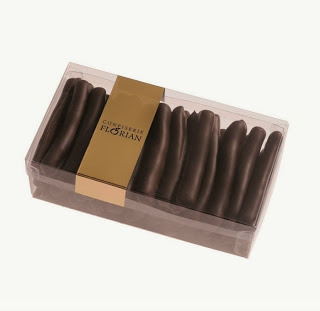
I just get a few other things so I don't have to dash around at the last minute, in a couple of months' time. Into the trap I fall. My trolley is laden, but not with the things I came in for. Too late to go back, I go home to a house full of chocolate-detecting aficionados.
There are limited new hiding places. Especially from myself.
I long for the future, when, never getting properly dressed or brushing my hair, spending even more of my time writing books and forgetting about the real world for days on end, I won't be able to remember where I've stashed my wicked treats. Then, I shall come upon a Milka Daim amongst the bag of summer hats I never wear or a slab of nougat in the lining of an old coat. How marvellous it will be to discover chocolate I didn't know I had!
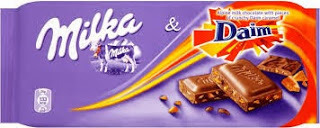
In the meantime, I shall exercise my willpower and watch, as my children and husband tuck in. After all I haven't told them about my secret stash. Ho! Ho! Ho!
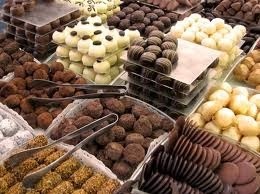
HAPPY CHRISTMAS!
Things go more slowly where I live, in SW France. But, (shock, horror) LeClerc already has all the chocs you could ever want and lots that you probably would rather not have, sitting on shelves specially allocated for 'seasonal goods'. Gone are the inflatable boats, the luminous bikinis and the swing-balls, replaced by pyramids of chocolate Santas, boxes of advent calendars to suit all pockets and handmade chocolates at extortionate prices.
They begin the campaign for over indulgence and excess where there is the least resistance. My particular favourite lies in wait: orange peel in dark chocolate.

I just get a few other things so I don't have to dash around at the last minute, in a couple of months' time. Into the trap I fall. My trolley is laden, but not with the things I came in for. Too late to go back, I go home to a house full of chocolate-detecting aficionados.
There are limited new hiding places. Especially from myself.
I long for the future, when, never getting properly dressed or brushing my hair, spending even more of my time writing books and forgetting about the real world for days on end, I won't be able to remember where I've stashed my wicked treats. Then, I shall come upon a Milka Daim amongst the bag of summer hats I never wear or a slab of nougat in the lining of an old coat. How marvellous it will be to discover chocolate I didn't know I had!

In the meantime, I shall exercise my willpower and watch, as my children and husband tuck in. After all I haven't told them about my secret stash. Ho! Ho! Ho!

HAPPY CHRISTMAS!
Published on November 06, 2013 12:52
October 19, 2013
Excerpt from my new novel: 'An Accidental Killing'
New release****New release****New release****New release****New release****New releaseAN ACCIDENTAL KILLINGCHAPTER ONE The man who stood on the coastal path was unremarkable. He was of average height and build, with thin mousy hair and a longish pointed nose. People put him at forty, but he was in fact thirty-four. He was considered plain by those who knew him, quiet to the point of alienating, and had never been in love. Now, he stared out to sea but watched instead a scene from his past, when he had been a boy; the kind of boy who stood alone in the school playground, who lacked friends but attracted enemies. This present memory came to him with a clarity that stirred a kind of nostalgia inside him that troubled him. He was not accustomed to pleasant reminiscing.
The body lay under a thin white sheet. In the corner of a large, sparsely furnished room Claude watched his father putting on clear plastic gloves. It was cold and the bright lights made it seem colder. He wished he had put on an extra sweater. When his father was ready, Claude stood back a little, waiting for the first glimpse. He knew that it was a man, a tourist from the south, killed in a traffic accident. ‘Are you ready?’ asked his father, smiling.‘Yes, father.’‘Very well.’ He pulled back the sheet.The man’s hair was dark and slicked back, apart from a strand that fell forward, partially adhering to a sticky-looking wound above his left eye. His complexion was already pale and bluish, lacking lustre. He was wearing casual but expensive clothes and, where his skin was exposed, he would have been tanned with the honey glow that you saw on television advertisements. His shoes had leather soles. As Claude helped his father to undress the corpse, he imagined the accident, the look on the man’s face before the impact that had left him suddenly lifeless. When he lay naked, his father said what he always said: ‘In death we are all equal, rich or poor, old or young!’ Claude liked the way he said it, almost like a prayer.‘Pass me the scalpel, will you?’ his father asked. ‘Unless you would like to try?’Claude smiled timidly and shook his head. ‘No matter,’ his father said, his eyes full of kindness. ‘Another time, another time.’ He took the instrument and made an incision in the neck of the dead man, inserted a tube and opened a large container of embalming fluid.The boy did not ask questions. He understood the process. Once more, Claude shivered in the cold, wishing again that he had dressed more warmly. He didn’t usually forget, but this time he had been in the garden playing, and in the sunshine it had been pleasantly warm.‘You can run and fetch a sweater,’ said his father. ‘I will do the face when you get back. Tell mother we will be ready for dinner at the usual time.’Inside the house, there was the warm moist smell of washing, vying with the meaty aroma of lasagne, and on the sideboard, shone a fresh green salad with small ripe tomatoes and pale flakes of parmesan cheese. Claude felt the first stirrings of hunger. In his room, he quickly found what he was looking for and ran back through the kitchen, his soft shoes making hardly a sound.‘Where are you going?’ He did not like to tell his mother. ‘Outside! We will be in for dinner at the usual time!’ he called, realising that she would know from the ‘we’ that he was going to watch his father, and swearing under his breath.Back inside the one-storey building which stood in the deep, cool shadows at the bottom of the garden of his mother’s house, there was a buzz from the lights overhead as he entered, and he saw his father from the back this time, bent over the body, his white coat luminous. ‘Have you started yet, father?’ said Claude, panting slightly.‘I said that I would wait, and I have,’ he replied, pleasantly. ‘Come to the other side and we can begin. Put on your gloves.’Claude pulled on the smaller gloves, bought specially for him, taking longer than he should because of his haste, grinning and jumping up and down a little on the spot. At last they were on. After his father had supervised the washing of the man’s face, he allowed his son to lather and shave it – delighting in the care and attention the lad took. The corpse’s lips were cracked and a little dehydrated so, after the usual moisturising, Claude applied a little soft wax to even out the surface. The lips were firm and moved like rubber, displaying pale gums and a good set of teeth. When Claude had finished, his father helped him insert the plastic discs, which kept the shape of the eyes, under the eyelids, and then he mixed up glue to seal the eyes and mouth shut. The body already looked healthier, more lifelike and yet not alive. Working from a photograph, it would be simple to render the man as fresh-faced in death as he had been before the accident. With his index finger Claude took a little foundation and began to dab it gently on the bruised area around the wound, which soon began to take on a natural fleshy tone. His father had cleaned out the dirt and used tape to close it. They worked closely together, their arms brushing one against the other, making them smile momentarily. Claude listened to his father’s breathing and caught the smell of garlic from his mouth. By the time they had finished, the man looked as though he had a small, almost invisible scar on an otherwise flawless complexion. ‘He was a handsome man,’ said Signor Cousteau, holding up the photograph they had worked from. ‘More handsome in death than in life, don’t you think?’‘Yes, father,’ replied Claude, sincerely.‘Put a little rouge on the cheeks,’ said his father. ‘That’s right, and a little on the nose. Yes. Now, on the forehead and just a little on the chin. Perfect!’‘Shall I put the lipstick on now, father?’‘Do you think he needs it?’‘Maybe a little,’ said the boy, more because he wanted to finish the job, not leaving anything out.‘Very well. Just a little.’The body was bruised where the seatbelt had been, but the family and friends would not see the torso of the deceased. The hands would need some attention, though, when he had been dressed.‘Is it time?’ asked his father.‘We have ten minutes more.’‘We will finish after dinner in that case. It is always better not to rush. Do you have homework tonight?’The boy hung his head a little. ‘Yes, father.’‘Then I will come alone. Thank you for your assistance, my son.’Claude looked up quickly and smiled at his father, who pretended to be busy with some clearing away. After taking off their gloves and washing their hands with a special antiseptic soap, they left the building and went up towards the main house, in order to take a shower and be ready for their meal. Claude put an arm around his father’s waist and felt the weight and warmth of a large hand on his shoulder. The garden was cooler now that the sun had gone below the tops of the trees. It was different out in the fresh air, where people lived and moved. More complicated thoughts invaded Claude’s head and he wished he could go back and finish the work, so that he could avoid the distractions that now assaulted his mind. His mother was draining the pasta when they entered, in the large traditional kitchen where she had grown up. She was still a beauty, it was said, and could have married into a grand Italian family. Instead, she had fallen in love with a Frenchman, who had never quite managed to make the required transition from one culture to another. He had come to Italy, for her, but his heart had never left France. So the story went. Claude knew the fairytale had not quite come true, but he was too young to understand why. His mother’s house. That was what his father called it, even after all the years he had lived in it. Involuntarily, an idea came to Claude: he wondered what it would be like to see her on the long, narrow table, covered by a thin white sheet. Drawing it back, he would do his best to take away the harshness in her face, to soften her expression and make her look happy.‘Be quick! The pasta will be ruined. Why can you never be on time!’ she said.The men did not speak, but hurried upstairs to wash.
On the coastal path, Claude allowed a smile to spread across his face. Exactly which memory was the author of such a pleasant reaction, was impossible to surmise.
If you would like to download 'An Accidental Killing' this is the link: http://www.amazon.co.uk/An-Accidental-Killing-Bev-Spicer-ebook/dp/B00G04DWWS/ref=sr_1_2?ie=UTF8&qid=1382189260&sr=8-2&keywords=an+accidental+killing
The body lay under a thin white sheet. In the corner of a large, sparsely furnished room Claude watched his father putting on clear plastic gloves. It was cold and the bright lights made it seem colder. He wished he had put on an extra sweater. When his father was ready, Claude stood back a little, waiting for the first glimpse. He knew that it was a man, a tourist from the south, killed in a traffic accident. ‘Are you ready?’ asked his father, smiling.‘Yes, father.’‘Very well.’ He pulled back the sheet.The man’s hair was dark and slicked back, apart from a strand that fell forward, partially adhering to a sticky-looking wound above his left eye. His complexion was already pale and bluish, lacking lustre. He was wearing casual but expensive clothes and, where his skin was exposed, he would have been tanned with the honey glow that you saw on television advertisements. His shoes had leather soles. As Claude helped his father to undress the corpse, he imagined the accident, the look on the man’s face before the impact that had left him suddenly lifeless. When he lay naked, his father said what he always said: ‘In death we are all equal, rich or poor, old or young!’ Claude liked the way he said it, almost like a prayer.‘Pass me the scalpel, will you?’ his father asked. ‘Unless you would like to try?’Claude smiled timidly and shook his head. ‘No matter,’ his father said, his eyes full of kindness. ‘Another time, another time.’ He took the instrument and made an incision in the neck of the dead man, inserted a tube and opened a large container of embalming fluid.The boy did not ask questions. He understood the process. Once more, Claude shivered in the cold, wishing again that he had dressed more warmly. He didn’t usually forget, but this time he had been in the garden playing, and in the sunshine it had been pleasantly warm.‘You can run and fetch a sweater,’ said his father. ‘I will do the face when you get back. Tell mother we will be ready for dinner at the usual time.’Inside the house, there was the warm moist smell of washing, vying with the meaty aroma of lasagne, and on the sideboard, shone a fresh green salad with small ripe tomatoes and pale flakes of parmesan cheese. Claude felt the first stirrings of hunger. In his room, he quickly found what he was looking for and ran back through the kitchen, his soft shoes making hardly a sound.‘Where are you going?’ He did not like to tell his mother. ‘Outside! We will be in for dinner at the usual time!’ he called, realising that she would know from the ‘we’ that he was going to watch his father, and swearing under his breath.Back inside the one-storey building which stood in the deep, cool shadows at the bottom of the garden of his mother’s house, there was a buzz from the lights overhead as he entered, and he saw his father from the back this time, bent over the body, his white coat luminous. ‘Have you started yet, father?’ said Claude, panting slightly.‘I said that I would wait, and I have,’ he replied, pleasantly. ‘Come to the other side and we can begin. Put on your gloves.’Claude pulled on the smaller gloves, bought specially for him, taking longer than he should because of his haste, grinning and jumping up and down a little on the spot. At last they were on. After his father had supervised the washing of the man’s face, he allowed his son to lather and shave it – delighting in the care and attention the lad took. The corpse’s lips were cracked and a little dehydrated so, after the usual moisturising, Claude applied a little soft wax to even out the surface. The lips were firm and moved like rubber, displaying pale gums and a good set of teeth. When Claude had finished, his father helped him insert the plastic discs, which kept the shape of the eyes, under the eyelids, and then he mixed up glue to seal the eyes and mouth shut. The body already looked healthier, more lifelike and yet not alive. Working from a photograph, it would be simple to render the man as fresh-faced in death as he had been before the accident. With his index finger Claude took a little foundation and began to dab it gently on the bruised area around the wound, which soon began to take on a natural fleshy tone. His father had cleaned out the dirt and used tape to close it. They worked closely together, their arms brushing one against the other, making them smile momentarily. Claude listened to his father’s breathing and caught the smell of garlic from his mouth. By the time they had finished, the man looked as though he had a small, almost invisible scar on an otherwise flawless complexion. ‘He was a handsome man,’ said Signor Cousteau, holding up the photograph they had worked from. ‘More handsome in death than in life, don’t you think?’‘Yes, father,’ replied Claude, sincerely.‘Put a little rouge on the cheeks,’ said his father. ‘That’s right, and a little on the nose. Yes. Now, on the forehead and just a little on the chin. Perfect!’‘Shall I put the lipstick on now, father?’‘Do you think he needs it?’‘Maybe a little,’ said the boy, more because he wanted to finish the job, not leaving anything out.‘Very well. Just a little.’The body was bruised where the seatbelt had been, but the family and friends would not see the torso of the deceased. The hands would need some attention, though, when he had been dressed.‘Is it time?’ asked his father.‘We have ten minutes more.’‘We will finish after dinner in that case. It is always better not to rush. Do you have homework tonight?’The boy hung his head a little. ‘Yes, father.’‘Then I will come alone. Thank you for your assistance, my son.’Claude looked up quickly and smiled at his father, who pretended to be busy with some clearing away. After taking off their gloves and washing their hands with a special antiseptic soap, they left the building and went up towards the main house, in order to take a shower and be ready for their meal. Claude put an arm around his father’s waist and felt the weight and warmth of a large hand on his shoulder. The garden was cooler now that the sun had gone below the tops of the trees. It was different out in the fresh air, where people lived and moved. More complicated thoughts invaded Claude’s head and he wished he could go back and finish the work, so that he could avoid the distractions that now assaulted his mind. His mother was draining the pasta when they entered, in the large traditional kitchen where she had grown up. She was still a beauty, it was said, and could have married into a grand Italian family. Instead, she had fallen in love with a Frenchman, who had never quite managed to make the required transition from one culture to another. He had come to Italy, for her, but his heart had never left France. So the story went. Claude knew the fairytale had not quite come true, but he was too young to understand why. His mother’s house. That was what his father called it, even after all the years he had lived in it. Involuntarily, an idea came to Claude: he wondered what it would be like to see her on the long, narrow table, covered by a thin white sheet. Drawing it back, he would do his best to take away the harshness in her face, to soften her expression and make her look happy.‘Be quick! The pasta will be ruined. Why can you never be on time!’ she said.The men did not speak, but hurried upstairs to wash.
On the coastal path, Claude allowed a smile to spread across his face. Exactly which memory was the author of such a pleasant reaction, was impossible to surmise.
If you would like to download 'An Accidental Killing' this is the link: http://www.amazon.co.uk/An-Accidental-Killing-Bev-Spicer-ebook/dp/B00G04DWWS/ref=sr_1_2?ie=UTF8&qid=1382189260&sr=8-2&keywords=an+accidental+killing
Published on October 19, 2013 06:40
October 11, 2013
I wish I were a weather girlworking on the telly.I'd smil...
I wish I were a weather girl
working on the telly.
I'd smile and say the clouds today
will taste like lemon jelly.
I'd pout and preen
and toss my head,
and butter sunshine
on your bread.
I'd banish drizzle
With a swivel
of my perfect hips.
Lips
of strawberry,
skin of cream,
I'd brighten up the dullest screen.
My dresses chosen with great care,
to cling
to all my bits.
I'm on display
Hip hip hooray!
I'm bound to be a hit.
Carol does it very well,
she's lovely I'll admit.
But if I got her morning slot,
I'd wear a hat
of honey bees
and chase away
the sexy Scot.
I wish I were a weather girl,
working on the telly.
I'd smile and say the clouds today
will taste like lemon jelly.
working on the telly.
I'd smile and say the clouds today
will taste like lemon jelly.
I'd pout and preen
and toss my head,
and butter sunshine
on your bread.
I'd banish drizzle
With a swivel
of my perfect hips.
Lips
of strawberry,
skin of cream,
I'd brighten up the dullest screen.
My dresses chosen with great care,
to cling
to all my bits.
I'm on display
Hip hip hooray!
I'm bound to be a hit.
Carol does it very well,
she's lovely I'll admit.
But if I got her morning slot,
I'd wear a hat
of honey bees
and chase away
the sexy Scot.
I wish I were a weather girl,
working on the telly.
I'd smile and say the clouds today
will taste like lemon jelly.
Published on October 11, 2013 04:20
October 2, 2013
A Taste of France
Boys, buses and profs.
If you asked me to get up at 6.00 am every morning, eat a bowl of cereal with chocolate shrapnel as its main ingredient, smothered in semi-skimmed UHT milk, shower, dress and lug a ridiculously heavy bag down to the bus stop in the dark, I'd probably think you were joking, bonkers or living in France.
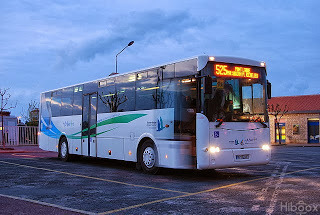
Watching my two teenage sons disappear around the corner and knowing that I won't see them again until twelve hours later, doesn't get any easier. The French school system is austere. Dare I say, outdated.
I have a 'convocation' coming up next week to listen to a presentation on a forthcoming school trip to Paris at which I am under orders not to embarrass my eldest by speaking to any of his friends, their siblings or parents. Apparently, my French accent is 'Wow!' or 'Are you serious?' I will however be required to steal a couple of minutes with his French prof to beg forgiveness for his latest 'commentaire' and, in fact, to raise the rather delicate question of what, exactly, a 'commentaire' is.
I do speak French quite well, although I can easily crumble in the face of teaching professionals (of which I am one), who have various strategies to hoodwink the unsuspecting parent into believing that they a) know who you are b) know who your child is, and c) understand how to do a 'commentaire'. I have an advantage with both a) and b) as I speak my own enthusiastic version of French, and have a son who is almost two metres tall, which means that we stand out from the crowd more than most. c) will be awkward, although I am ever the optimist and hope for at least a snippet of useful information amongst the piffs and paffs and shoulder shrugging.
Zut alors!
I'll let you know what happens.
In the meantime, I have just remembered that today is Wednesday, a half-day at schools in France, so I shall have to get moving in order to prepare a mountainous twelve o'clock lunch for two ravenous boys.
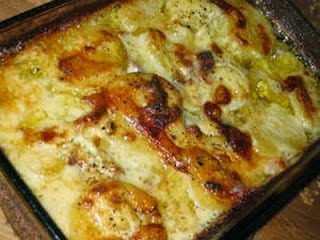
Tartiflette
Life is good.
If you asked me to get up at 6.00 am every morning, eat a bowl of cereal with chocolate shrapnel as its main ingredient, smothered in semi-skimmed UHT milk, shower, dress and lug a ridiculously heavy bag down to the bus stop in the dark, I'd probably think you were joking, bonkers or living in France.

Watching my two teenage sons disappear around the corner and knowing that I won't see them again until twelve hours later, doesn't get any easier. The French school system is austere. Dare I say, outdated.
I have a 'convocation' coming up next week to listen to a presentation on a forthcoming school trip to Paris at which I am under orders not to embarrass my eldest by speaking to any of his friends, their siblings or parents. Apparently, my French accent is 'Wow!' or 'Are you serious?' I will however be required to steal a couple of minutes with his French prof to beg forgiveness for his latest 'commentaire' and, in fact, to raise the rather delicate question of what, exactly, a 'commentaire' is.
I do speak French quite well, although I can easily crumble in the face of teaching professionals (of which I am one), who have various strategies to hoodwink the unsuspecting parent into believing that they a) know who you are b) know who your child is, and c) understand how to do a 'commentaire'. I have an advantage with both a) and b) as I speak my own enthusiastic version of French, and have a son who is almost two metres tall, which means that we stand out from the crowd more than most. c) will be awkward, although I am ever the optimist and hope for at least a snippet of useful information amongst the piffs and paffs and shoulder shrugging.
Zut alors!
I'll let you know what happens.
In the meantime, I have just remembered that today is Wednesday, a half-day at schools in France, so I shall have to get moving in order to prepare a mountainous twelve o'clock lunch for two ravenous boys.

Tartiflette
Life is good.
Published on October 02, 2013 02:25
September 27, 2013
'ANGELS' - A mother's revenge.
For the next four days, my short story 'Angels' will be free to download onto any electronic device.
I like to explore emotional responses to all kinds of situations, because the human mind is endlessly fascinating, resourceful and mysterious. I know I am reading a good book when the words on a page strike a note, and I experience a strong affinity with a character. I like to see and feel as I read. I prefer a book to be about real people, not stereotypes. And setting is important, too. I do not like description for its own sake, but to create an atmosphere, a backdrop for the story.
'Angels' is about a mother who loses her daughter to bullying at school and decides to take revenge. I wanted to walk with her through the forest and understand her motivations. I hope I have avoided sentimentality. I am aiming for something much deeper.
Plot is important, too. There are a few surprises and points of interest along the way. There is even an intrepid 19th century inventor, who jumps from the Eiffel Tower, wearing a homemade parachute! He was quite determined, as you can see if you click on the link below.
There is an unusual ending to 'Angels', which I hope will satisfy. Why not download it and let me know what you think? Many thanks.
Download 'Angels' FREE by clicking on this direct link to Amazon: http://www.amazon.co.uk/Angels-ebook/dp/B009DFGNFO/ref=cm_cr_pr_pb_i
You can watch this short (less than two minutes) film on You Tube, either before or after you've read 'Angels': http://www.youtube.com/watch?v=FBN3xfGrx_U
I like to explore emotional responses to all kinds of situations, because the human mind is endlessly fascinating, resourceful and mysterious. I know I am reading a good book when the words on a page strike a note, and I experience a strong affinity with a character. I like to see and feel as I read. I prefer a book to be about real people, not stereotypes. And setting is important, too. I do not like description for its own sake, but to create an atmosphere, a backdrop for the story.
'Angels' is about a mother who loses her daughter to bullying at school and decides to take revenge. I wanted to walk with her through the forest and understand her motivations. I hope I have avoided sentimentality. I am aiming for something much deeper.
Plot is important, too. There are a few surprises and points of interest along the way. There is even an intrepid 19th century inventor, who jumps from the Eiffel Tower, wearing a homemade parachute! He was quite determined, as you can see if you click on the link below.
There is an unusual ending to 'Angels', which I hope will satisfy. Why not download it and let me know what you think? Many thanks.
Download 'Angels' FREE by clicking on this direct link to Amazon: http://www.amazon.co.uk/Angels-ebook/dp/B009DFGNFO/ref=cm_cr_pr_pb_i
You can watch this short (less than two minutes) film on You Tube, either before or after you've read 'Angels': http://www.youtube.com/watch?v=FBN3xfGrx_U
Published on September 27, 2013 00:11
September 5, 2013
French Living
Obviously, I am 'living the dream' - this is just what happens the rest of the time:
Got back from the coast to find that the bakery was shut. Monday closing. So was the Co-op. No bread, no milk, no cereal. The boys were not amused. I’ve been here for nearly five years now and I still can’t get used to the French way of life.
I get up between 7.00 and 10.00 depending on who needs me to be conscious and in the kitchen. I don’t plan much, so meals are last minute inventions. Yesterday we had cheese with tortillas and fig jam. They were quite nice, actually. So, today was not too much of a challenge, once I’d found some burger buns in the freezer and made ‘sandwiches’ with lardoons, and tomatoes from the garden. Went down well.
I talked about writing a list, over coffee with my husband. Too many things to do, depressing not to get stuff done, blah, blah. He dozed off in his chair, basking in the sunshine before work. Then I started on the laundry room – the least renovated and most uncleaned part of the house. The washing machine is in one corner, with the tumble drier on top (I sometimes like to shrink clothes). There is a manky Butler sink with a tap that spurts water in most directions. The laundry basket is generally overflowing with clean clothes that my children shove in regardless, fresh from their bedroom floors. Most horrendous of all are the temporary plastic shelves that house 101 almost empty bottles of lotions, soaps, sun creams, etc and millions of out-of-date potions from the pharmacy.
I have to mention that the pharmacy is the most important shop in the village and is always busy. In France people love to buy medicine. You can’t get anything in the supermarket, not even a box of paracetemol - you have to go to the pharmacy. I went with my son today to get a certificate for him to play football from the doctor’s (all to do with insurance, apparently!) then to pick up some becotide and a knee strap. We were offered various other medication for no particular reason, and the assistant was amazed that we only wanted what we came in for. I advised my son to forget about languages and train to be a pharmacist.
Anyway, back to the laundry room. Cobwebs, dust from the stone walls, various stains – it would not be a one-hour job (I refer you to my unmade list). I hung out the washing and snipped off a dead sunflower, deadheaded a million roses and stick-flicked a cat poo (not recommended). Cup of tea. ‘I’m hungry’ alert went up – still no bread. Thank God for baked beans and omelette.
Dishwasher loading by eldest son.
Spider chasing re-commenced at around 3.00 and mopping followed hoovering (hoover had to be coaxed three times after choking on small stones - from mortar currently holding walls up). Then, I went shopping. Spent a fortune and watched my purchases pile up as I tried to unload and pack at the same time. Did not thank the assistant for not stopping the conveyor belt or noticing that I was willing her to break the habit of a lifetime and help me pack (in France you are on your own at the checkout).
Back home and a reluctant return to the laundry room, via petrol station (where I was behind a man with a deathwish -smoking) and a shop called Foire Fouille where I bought some of those funny 80s shelves that look like boxes and are stepped – meant for ornaments, I think, but perfect for shoes that normally reside on laundry room floor. Bingo.
Self assembly.
Laundry room finished, shoes stacked on shelves (rocket science degree required to put together).
Glass of wine in the garden was nice, as was mosquito bite on instep. Then re-appearance of boys led to preparation of newly purchased chicken kievs with potatoes dauphinoise (canned) and haricots verts. I wasn’t hungry.
So, tomorrow? Stuff the housework, I’m going to work on my book, which has been ‘finished’ for months and will never be published if I don’t ignore the chaos of a crumbly old house in France for a while and just get on with it.
Published on September 05, 2013 05:51
August 11, 2013
Caravan holidays
I'm having a lovely couple of weeks in a luxurious mobile home in the SW of France (very kind parents-in-law). My two boys are out playing football until midnight and I'm sitting on the sumptuous couch wondering at how nice it is to have no less than two bathrooms, a state of the art kitchen and spacious decking. The boys' bedroom is at one end and mine at the other. What planning!
Caravans weren't quite like this when I was little. They didn't use to have showers, or toilets for a start! The one we spent our holidays in was at a place called Green Acres in North Wales. Nearest beach was Black Rock sands.
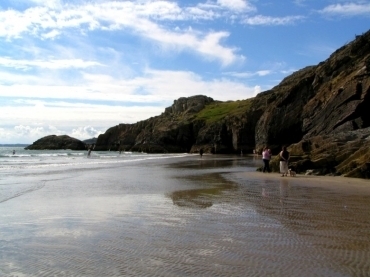
The van was pale green and cream, with a large living area and bay window (some things don't change). I remember we cooked on gas because my mother left it on regularly, but failed to see any of us off, luckily. In those days, the smell was powerful. We had bunk beds to sleep in. Cramped, no head room and hardly long enough to stretch out. We zipped ourselves into sleeping bags and hoped we wouldn't need a wee in the night.
We went to the beach no matter what the weather was like, put on crinkly swimming costumes and ran up and down to keep warm. My mother tied a line to our wrists when we went in the sea, as though the three of us were ungainly kites, taken by the treacherous currents rather than the wind. We had a dinghy, too, which caused a great deal of bickering as it wasn't big enough for all of us at the same time.
At the end of the day, when we were blue, Mum stuck our heads through specially made ponchos so we could get dressed without showing our bottoms, then we would be allowed to sit on Dad's lap and drive the Volkswagen Camper Van up and down the beach, veering towards the waves and screaming loudly.
If we were good, we went along 'the rabbit run' to Criccieth, singing 'Run rabbit, run rabbit, run, run, run...' whenever one bounded into the road ahead, as they often did. It was a winding road and, in the dark, the whole adventure was even more thrilling. In Criccieth, after we'd looked at the castle, we had fish and chips, sitting on the sea wall, followed by a Cadwalader's ice cream, with its secret ingredient, which was rumoured to be honey.
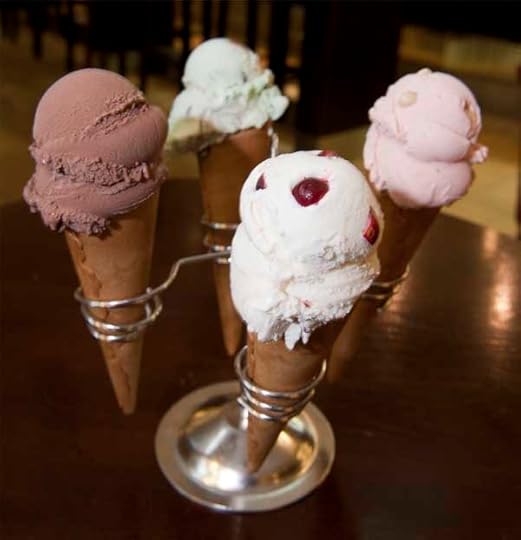
Home again and out like a light while Mum and Dad sat outside talking and laughing, having a drink and a smoke in a rare moment of calm under clear, starry skies.
Those were happy days, indeed.
Published on August 11, 2013 14:16



